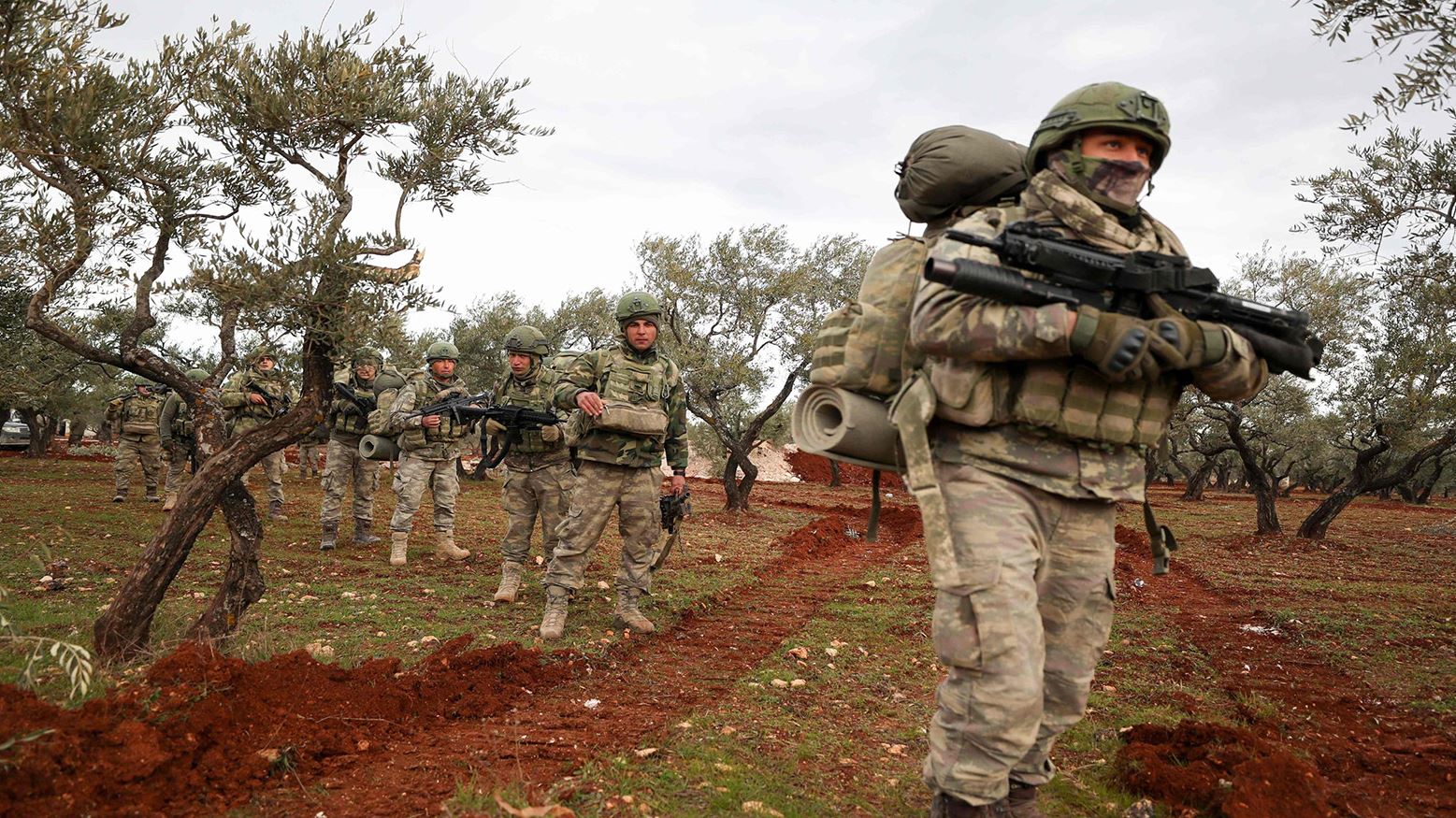Turkey Retaliates Against PKK, yet Contradicts Support for Hamas
The Saturday attacks are seen as retaliation for earlier on Friday, when at least six Turkish soldiers had been killed in a fight with the PKK militants in the Kurdistan Region’s Duhok Province.

ERBIL (Kurdistan24) - The Turkish Defense Ministry on Saturday announced that five Kurdistan Workers’ Party (PKK) and People's Defense Units (YPG) fighters were “neutralized” in northeastern Syria as part of its Euphrates Shield campaign, according to a post by the ministry on the recently rebranded social media platform known as X.
The post read "Wherever it is, our fight against the terrorist organization PKK/YPG will continue until the last terrorist is neutralized!"
The Kurdish combatants were allegedly “preparing to attack the Turkish Army,” before they were subdued by Turkish commandos.
The ministry, along with the Turkish Armed Forces, frequently uses the term “neutralized” when describing combatants that are either killed or injured.
Read More: Clashes kill six Turkish soldiers killed in Kurdistan Region, announces defense ministry
The Saturday attacks are seen as retaliation for an incident earlier on Friday, when at least six Turkish soldiers had been killed in a fight with PKK militants in the Kurdistan Region’s Duhok Province.
Turkish security forces have regularly accused both the YPG and its parent organization, the Syrian Democratic Forces (SDF), of being offshoots of the PKK.
The PKK is listed as a terrorist group by the US, Turkey, and the EU, among other countries, most of which are eastern Turkic countries.
For Turkish President Recep Tayyip Erdogan, any precondition for diplomatic relations with Turkey requires labeling both the YPG and PKK as terrorist organizations, and sometimes, for countries like Sweden and Finland, fulfilling a bid to join NATO requires handing over Kurdish fugitives with suspected PKK ties to Turkey, essentially holding the two Nordic countries hostage.
- Gaza Contradiction -
While Erdogan has in the past labeled Hamas as "a liberation group” seeking to evict an occupying Israeli state, he has not given ethnic Kurds in Turkey that same concession, despite their long-documented, autonomous history in the region and their consideration as the largest numbering stateless people in the world.
Meanwhile, the Turkish president has continued his war of words against Israeli President Benjamin Netanyahu, whom he recently called "the Butcher of Gaza.”
The long simmering tensions between the two military powerhouses goes back to May 2018, when Erdogan posted on X that Hamas is not a terrorist organization.
Netanyahu took such offense to this remark, that he resorted to double-standards and whataboutism, and responded "A man whose hands are stained with the blood of countless Kurdish citizens in Turkey and Syria is the last one who can preach to us about combat ethics.”
Netanyahu has made similar pro-Kurdish remarks, such as in Oct. 2019, when the Turks invaded northern Syria, alleging the Syrian Democratic Forces (SDF) are an offshoot of the Kurdistan Workers’ Party (PKK), widely recognized as a terrorist organization by the West.
Netanyahu then again criticized Erdogan, saying “Israel strongly condemns the Turkish invasion of the Kurdish areas in Syria and warns against the ethnic cleansing of the Kurds by Turkey and its proxies,” while further noting, “Israel is prepared to extend humanitarian assistance to the gallant Kurdish people.”
- Explicit Support for Hamas -
The bickering has not just been for political posturing, as in 2020, it was reported that Turkey had given 12 Hamas operatives Turkish citizenship.
There has also been concrete evidence that Turkey has been arming Hamas with weaponry, as a Reuters report on Sept. 14 documented concerns by Israeli customs authorities that Turkey exported a 16-ton shipment of “rocket-making substances” to Hamas.
Furthermore, Turkey was earlier this month accused by the US Treasury Department for sheltering Hamas' finances.
Thus, the cordial relations between Turkey and Hamas, labeled a terrorist organization by the EU and the US, have alarmed members of the NATO alliance. While Israel is not a NATO power, it has a "Major non-NATO ally" designation, rendering it essentially immune to any direct or indirect aggression by the alliance.
Analytically, it shows that the EU and US are willing to appease Turkey and label the PKK as a terrorist organization, yet Turkey refuses to return the favor for its NATO allies and label Hamas as a terror group as well, questioning the country's actual commitment to the alliance.
It was 23 days after the alleged Sept. 14 arms shipment from Turkey that Hamas launched its ambush attack, known as Operation Al-Aqsa Storm, on Oct. 7 along with thousands of rockets fired towards Israel. They then led a ground assault on the southern Israeli city of Re’im, where they brutally massacred Israeli civilians at the Nova Festival.
Read More: UK Sanctions Iran for Support for Hamas in Coordination with the US